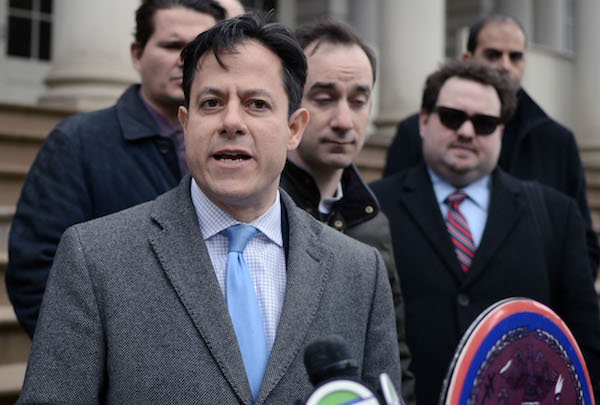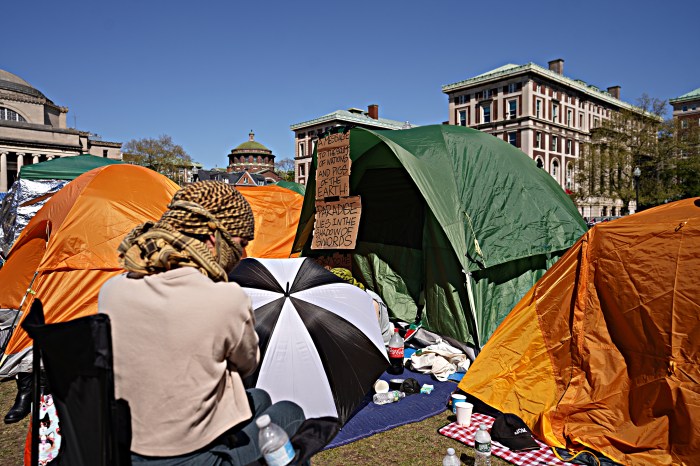
BY JACKSON CHEN | City Councilmembers across Manhattan are calling for reform of a decades-old, burdensome commercial rent tax that they say is pushing many local businesses into extinction.
The commercial rent tax was created in 1963 as a revenue generator for the city, and charges businesses paying more than $250,000 in annual rent a 3.9 percent levy. In the 1990s, the C.R.T. was restricted to Manhattan businesses below 96th St., which was followed by another amendment that exempted part of Lower Manhattan after 9/11.
Calling the tax “out of whack and antiquated,” Councilmember Dan Garodnick led a rally on Feb. 13 to build support for a package of bills that were introduced to reform the C.R.T. The councilmember, who chairs the Council’s Economic Development Committee, said the tax currently unduly penalizes many small businesses, including restaurants, hardware stores and boutiques.
“You ever wonder why we’re being overrun by banks and chain drug stores in Manhattan?” Garodnick said. “Well, this tax on commercial rent is one of your prime culprits.”
The first bill, sponsored by Garodnick and Helen Rosenthal, would double the threshold to pay the C.R.T. to $500,000. Garodnick said they looked at a variety of possible minimum rent levels before settling on $500,000, a figure that would exempt up to 4,000 local businesses currently hit with the fee.
The C.R.T., Garodnick said, currently generates around $780 million annually for the city, and earlier estimates by the Council showed the proposed change would cost the city $55 million of that.
Two others in the series of bills, sponsored by Borough President Gale Brewer and Councilmember Corey Johnson, would specifically provide exemptions from the C.R.T. for affordable supermarkets, as well as billboards that advertise theatrical works, regardless of the rent they pay.
Rosenthal is joined by Councilmember Margaret Chin in backing another bill that would require the city’s Department of Finance to conduct annual reports on what amount businesses are paying the C.R.T.
Rosenthal said she is acutely aware of the C.R.T.’s impact on businesses in her Upper West Side district. She emphasized that those small enterprises provide jobs to workers who come from all over the city.
Johnson said the loss of local businesses has a quality-of-life ripple effect throughout communities.
“If you live in a neighborhood and the locksmith closes, or the affordable supermarket closes, or the shoe-repair store closes, or the bodega closes, or the local pharmacy closes, that affects your quality of life in your neighborhood,” he said. “It just doesn’t make any sense that for a small portion of the city we have this tax.”
Andrew Rigie, the executive director of the New York City Hospitality Alliance, whose members include restaurants, bars, lounges and hotels, said the package of bills doesn’t completely fix the problem, but is a step in the right direction.
“It is very depressing when every day it seems like you open a newspaper, listen to the radio, and one of our beloved local businesses has shut down,” Rigie said. “We have this incredible bill that will help 4,000 businesses right here in Manhattan get some desperate financial relief.”
When asked about the mayor’s and his fellow councilmembers’ views on the proposed measures, Garodnick said there was some openness and that he believes that support for reforming the C.R.T. will build.
“We should do away with it entirely,” Garodnick said of the tax. “We’re taking steps today to start that process, trying to deliver some level of immediate fairness to these small businesses for the sake of the businesses themselves, the communities they’re serving, and the people from all around the city who work in them.”
Meanwhile, advocates for the Small Business Jobs Survival Act, said the package of tax-relief bills is just an insufficient band-aid for a much larger problem. The S.B.J.S.A. would provide for mediation, followed by arbitration, when tenants and landlords can’t agree on lease-renewal terms. But, year after year, the City Council’s leadership — cowed by the city’s powerful real estate lobby — has blocked the bill from ever coming up for a vote.
“What good is a tax cut if you don’t have a lease?” scoffed Kirsten Theodos of Take Back NYC, a leader in the push for the S.B.J.S.A. “I think they are disingenuously selling this to ‘save affordable grocery stores’ when they know full well that the Associated market at Stuy Town — the same owner as the Associated that closed in Corey Johnson’s district on W. 14th St. — is being denied a lease renewal. They were denied a lease renewal in December — so how would this new tax cut help them? The answer is it wouldn’t save them or any other business that shutters from insane rent hikes or being denied a lease renewal.
“It’s sad when our electeds go on record acknowledging a mom-and-pop crisis,” Theodos said, “then push legislation that doesn’t even address the crux of the problem — high rents and no right to a lease renewal.”

















